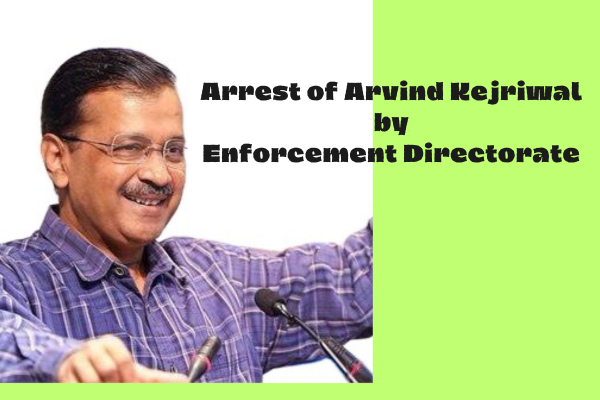
The recent arrest of Arvind Kejriwal, the Chief Minister of Delhi, has stirred a nationwide debate. This article aims to do detail analysis of Delhi Liquor Scam and ED’s Proceedings.
Understanding the Charges
The Allegations
Kejriwal faced allegations related to the Delhi liquor policy case, which led to his arrest. We’ll explore the details of these allegations.
What is Delhi’s New Liquor Rules
The Delhi liquor policy, officially known as the Excise Policy 2021-22, was a significant reform introduced by the Delhi government with the following key features:
• Implementation Date: The policy came into effect on November 15, 20211.
• Privatization of Liquor Sales: It marked the government’s exit from the liquor business, transitioning the trade to private players1.
• Policy Objectives: The policy aimed to improve the consumer experience, shut down black marketing, and increase revenue2.
• Zonal Division: Delhi was divided into 32 zones, each with a set number of liquor vends.
• Licensee Flexibility: Licensees were allowed to offer discounts and run well-lit, air-conditioned shops for a better customer experience.
• Home Delivery: The policy permitted home delivery of liquor through websites and apps.
• Dry Days and Operating Hours: It reduced the number of dry days and allowed bars in hotels and restaurants to stay open until 3 am.
However, the policy faced allegations of procedural irregularities and favoritism, leading to a high-profile investigation and legal actions against several government officials, including the Chief Minister, Arvind Kejriwal
ED’s Accusations:
The allegations against Arvind Kejriwal in the Delhi liquor policy case suggest that the amount was received through a kickback scheme. According to the Enforcement Directorate (ED), the scam involved giving wholesale liquor business to private entities with a fixed margin of 12%, in exchange for a 6% kickback. The ED has accused Kejriwal of being the key conspirator and claimed that he demanded and received several crores of rupees as kickbacks from a group referred to as the ‘South group’ for formulating and implementing the Delhi Excise Policy. The proceeds from these alleged kickbacks were also purportedly used for election campaigning in Goa.
( A kickback is an illegal payment that is secretly given in return for a favor or service. It’s often associated with corruption, as it involves giving someone money or another benefit to gain an advantage, such as winning a contract or influencing a decision. )
In the Delhi liquor policy case, several individuals were arrested alongside Arvind Kejriwal. These include:
- Manish Sisodia: Former Deputy Chief Minister of Delhi
- Sanjay Singh: AAP Member of Parliament
- Vijay Nair: Head of AAP Communication Wing
- K. Kavitha: BRS Leader
- Gautam Malhotra: Son of a former MLA from Akali Dal
- Sameer Mahendru: Owner of Indospirit
- Amit Arora: Owner of Vaddi Retail
- P. Sharad Reddy: Promoter of Arvindo Group
- Abhishek Bonpalli: Member of South Group
- Buchibabu Gorantla: Former MLA of Kavita
- Binoy Babu: Regional Head of Record India
- Rajesh Joshi: Director of Chauriyet Productions
- Dinesh Arora: Owner of a restaurant chain
ED issued Sunmon to Arvind Kejriwal
The Enforcement Directorate (ED) issued multiple summons to Delhi Chief Minister Arvind Kejriwal in connection with the investigation into the Delhi excise policy case. Kejriwal was arrested after he skipped several of these summons.
What is ED’s Summon ?
When the Enforcement Directorate (ED) issues a summon, it is a legal order requiring a person to appear before the ED for the purpose of giving evidence or producing documents during an investigation.
The power to issue summons is granted under Section 50 of the Prevention of Money Laundering Act (PMLA), and it gives the ED authority similar to that of a civil court for investigation purposes.
Non-compliance with an ED summon can lead to penalties and potential legal action under Section 174 of the Indian Penal Code, which includes a jail term and/or fine.
Why Enforcement Directorate (ED) arrested Delhi Chief Minister Arvind Kejriwal?
The Enforcement Directorate (ED) arrested Delhi Chief Minister Arvind Kejriwal in connection with the money laundering probe linked to the excise policy case. Here are the reasons for his arrest:
- Search and Questioning: The ED conducted searches at Kejriwal’s official residence and questioned him for nearly two hours.
- Non-Cooperation: Kejriwal was arrested after he skipped several summons issued by the ED.
- Allegations: The ED has called Kejriwal a “conspirator” in the case, alleging that he was involved in formulating a policy that benefited a specific liquor lobby.
- Kickbacks: It is claimed that the “South Lobby” gave ₹100 crore to the AAP as part of the alleged scam.
- Charge Sheets: Kejriwal’s name has been mentioned multiple times in the charge sheets filed by the ED.
- Judicial Refusal: His arrest came hours after the Delhi High Court refused to grant him interim protection from coercive action in the money laundering probe.
Kejriwal’s arrest has made headlines on prominent national and international platforms, with discussions about its timing ahead of the general elections and its potential as a political maneuver by the ruling party.
What’s your thoughts on this mention in the comment section??
Leave a Reply